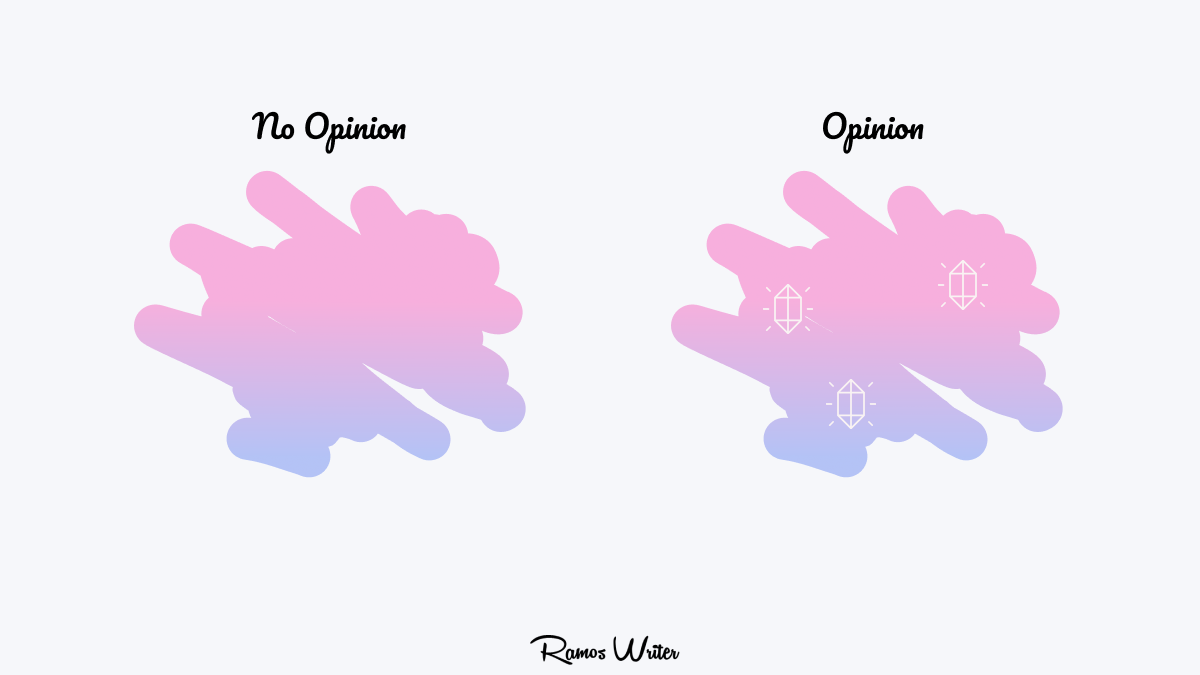What is opinionated writing & how to do it well?
Why only sharing information is no longer enough.

Here's the setup: you just read something that gave you a rush of feelings. Maybe it was a positive experience, and you're grinning ear-to-ear. Or perhaps, the writer really irked you with what they said, and now you’re fuming.
Both scenarios are the result of opinion writing. On the one end, a writer shared a belief, idea, or argument from their point of view. On your end, the writing made you react in a certain way, either in agreement or disagreement.
With this basic definition in place, let’s dive into a few more details about what opinion writing is, how it works, and why it’s important (and even profitable) when done well.
What is the purpose of opinion writing?

Most examples of this type of communication fall into one of three categories.
To explain a point-of-view.
The first level of opinionated writing occurs when a person aims to show the merits of their perspective. They typically do this by sharing related facts and experiences they've acquired.
Curation, collecting and presenting the work of others, is a great tool to use for this purpose since it enables you to leverage trustworthy sources to support your position.
To convince or persuade.
The next level of opinionated writing has a more difficult goal: not only to inform you of a different viewpoint but to have you adopt it as your own.
Understanding the (psych link) mechanics of copywriting and the psychology of persuasion are skills you’ll certainly want to develop to accomplish this.
To set a person or business apart.
Lastly, opinionated writing is an excellent way for entities to show how they differ from their competition. On an individual level, this can mean building a personal brand around a contrarian subject.
In business, this is how you carve out a niche segment of devoted customers.
Why is opinion writing important?
When the internet first began, there was a massive demand for information. For the first time in history, people could learn about almost any subject from any human. Over time, this problem was solved and a new one emerged.
We now have an excess of information but a lack of tools to help us navigate it and a lack of trusted voices to help us understand it. This is where opinion writing comes in.
This type of communication helps people identify sources of information they trust and align with so they can more easily and effectively navigate our digital world. More than ever, people are aware of each other's biases and want them communicated upfront.
But doesn’t this cause divisions? And aren’t some opinions dangerous or wrong?
On the first question, the answer is yes — but it's also not so straightforward. We live in a world divided in many ways, such as geography, language, and opportunity. Shared opinions can unite people across those boundaries.
As for the second question, this is also true. Not all opinions should be given a platform because of their potential harm. But identifying these can be challenging since a variety of beliefs is vital for society to function. Often, even the most disparate ideas overlap more than either side would admit to!
Ultimately, sharing your opinions will help you build trust with like-minded people.
3 examples of opinion writing in action
To wrap up, I want to show you three examples of opinionated content in action.

- The first example is another article on this blog that aims to explain why most bloggers fail because of their toolset and persuade them to try a different, proven approach. So, instead of simply sharing my information — I wrap it in an argument, and people who agree with my point of view will be more likely to follow my advice.

- The second example is a newsletter that explains the business strategy behind complex technological subjects. By positioning their opinions in an educational way, they've gathered a large audience and built a deep reservoir of trust.

- Our third example is a political newsletter that takes a unique approach to divisive topics by presenting each side's ideas and reasoning. Then, to set themself apart, they conclude by sharing their own well-supported view (which is usually a mix of both).
One thing is certain, as the amount of information in the world continues to grow, so will the demand for opinionated guides. Ones who are willing to be honest about what they believe, able to share their ideas online, and ready to defend their perspectives. Will this be you?



